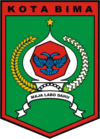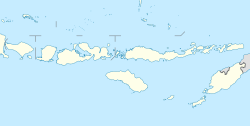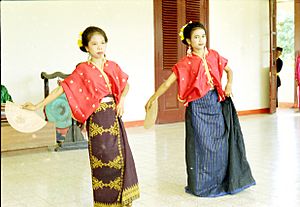Bima facts for kids
Quick facts for kids
Bima
Mbojo
|
||
|---|---|---|
|
City
|
||
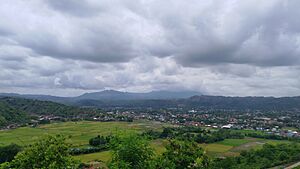
Bima city view
|
||
|
||
| Motto(s):
Maja Labo Dahu (Bima)
(Be Humble and Piety) |
||
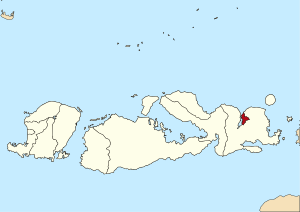
Location within West Nusa Tenggara
|
||
| Country | ||
| Region | Lesser Sunda Islands | |
| Province | ||
| Area | ||
| • Total | 222.25 km2 (85.81 sq mi) | |
| Population
(mid 2023 estimate)
|
||
| • Total | 161,362 | |
| • Density | 726.038/km2 (1,880.43/sq mi) | |
| Time zone | UTC+8 (Indonesia Central Time) | |
| Area code | (+62) 374 | |
| Vehicle registration | EA | |
Bima City (also called Mbojo in the local Bima language) is a lively coastal city on the eastern side of Sumbawa Island in Indonesia. It's part of the West Nusa Tenggara province.
Bima is the largest city on Sumbawa Island. In mid-2023, about 161,362 people lived there. The city is surrounded by a larger area called Bima Regency, but it's a separate city on its own.
Most people in Bima and eastern Sumbawa speak the Bima language, which they call Nggahi Mbojo. From 1620 to 1958, Bima was the capital of the Bima Sultanate, a powerful kingdom. Today, Bima City is an important center for business and trade in Eastern Sumbawa. Many people from other parts of Indonesia, like Java, Bali, and Lombok, have moved here.
The city has a busy downtown area for shopping and business. You can find the Sultan Salahuddin Mosque and the Sultan Salahuddin Museum here, which used to be the palace of the Bima Sultanate. Bima is connected by roads to nearby towns like Dompu and Sape.
Contents
City Districts
Bima City is divided into five main areas called districts (kecamatan). Each district has its own administrative center and several urban villages (kelurahan). These districts are:
- Rasanae Barat (West Rasanae)
- Mpunda
- Rasanae Timur (East Rasanae)
- Raba
- Asakota
These districts vary in size and population, with some being more crowded than others.
Where is Bima?
The city is located right on the eastern shore of Bima Bay. Long ago, Bima was a very important port city. It connected to other port cities in Eastern Indonesia, like Makassar and Ternate. It also had links to ports in Lombok, Bali, and East Java. This made Bima a key place for trade and travel by sea.
Bima's Weather
Bima has a tropical savanna climate. This means it has two main seasons:
- Dry Season: From April to November, there is moderate to little rainfall.
- Wet Season: From December to March, the city experiences heavy rainfall.
| Climate data for Bima | |||||||||||||
|---|---|---|---|---|---|---|---|---|---|---|---|---|---|
| Month | Jan | Feb | Mar | Apr | May | Jun | Jul | Aug | Sep | Oct | Nov | Dec | Year |
| Mean daily maximum °C (°F) | 30.3 (86.5) |
29.8 (85.6) |
30.6 (87.1) |
31.0 (87.8) |
30.5 (86.9) |
30.1 (86.2) |
30.1 (86.2) |
30.7 (87.3) |
31.2 (88.2) |
31.6 (88.9) |
30.9 (87.6) |
30.3 (86.5) |
30.6 (87.1) |
| Daily mean °C (°F) | 25.6 (78.1) |
25.4 (77.7) |
25.9 (78.6) |
25.9 (78.6) |
25.2 (77.4) |
24.6 (76.3) |
24.1 (75.4) |
24.4 (75.9) |
25.0 (77.0) |
25.9 (78.6) |
26.2 (79.2) |
25.8 (78.4) |
25.3 (77.6) |
| Mean daily minimum °C (°F) | 21.0 (69.8) |
21.1 (70.0) |
21.3 (70.3) |
20.9 (69.6) |
20.0 (68.0) |
19.2 (66.6) |
18.1 (64.6) |
18.1 (64.6) |
18.9 (66.0) |
20.2 (68.4) |
21.5 (70.7) |
21.3 (70.3) |
20.1 (68.2) |
| Average rainfall mm (inches) | 211 (8.3) |
194 (7.6) |
165 (6.5) |
102 (4.0) |
57 (2.2) |
38 (1.5) |
21 (0.8) |
11 (0.4) |
10 (0.4) |
34 (1.3) |
110 (4.3) |
194 (7.6) |
1,147 (44.9) |
| Source: Climate-Data-org | |||||||||||||
Who Lives in Bima?
In 2020, Bima had a population of about 155,140 people. The population isn't spread evenly; more people live in areas with lots of businesses and government offices.
Most people in Bima are Muslims, making up about 97% of the population. There are also smaller groups of Protestants, Catholic Christians, Hindus, and Buddhists.
Getting Around Bima
Bima is well-connected by roads. The main trans-Sumbawa road links Bima to Sape Harbour in the east and Dompu in the southwest. You can also take buses from Bima to other cities on Sumbawa, and even as far as Mataram in Lombok.
For air travel, Sultan Muhammad Salahudin Airport is located just outside Bima. Airlines like NAM Air and Wings Air fly from Bima to Lombok, Denpasar, and Makassar. Long ago, before World War II, Bima was even a stop for Qantas Airways' flying boats on their route between Sydney and Singapore!
Bima's History
Long ago, in the Middle Ages, Bima was one of the furthest places where Hinduism spread in Southeast Asia. This was because of strong influences from Greater India.
Bima was once one of the four important sultanates on Sumbawa Island. From the 17th to the 20th centuries, it was the capital of the Bima Sultanate. You can still see the old palace of the city's rulers today. In the early 1600s, the old Hindu kingdom on Sumbawa's east coast became an Islamic sultanate.
In 1792, the Sultan of Bima, Abdu'l Hamid Muhammad Shah, made an agreement with the Dutch East India Company. This agreement meant that Bima became protected by the Dutch.
Fun Things to Do in Bima
Bima and its surrounding areas have many interesting places to visit:
- Natural Wonders: You can explore Mount Tambora, visit Snake Island, or see the beautiful Ana Fari Lake (also known as the Lake of the Angels). Satonda Island is another natural gem. There are also many lovely white sandy beaches to discover, both north and south of Bima.
- Cultural Sites: In the city, you can visit the Sultan Salahuddin Mosque, the Terapung Mosque, and the Sultan Salahuddin Museum. The museum used to be the Bima Sultanate palace and is full of history.
- Traditional Villages: Explore the unique Wawo traditional Village and Sambori Traditional Village to learn about local culture.
- Activities: Many visitors come to the area to surf at Hu'u beach or go hiking on Mount Tambora.
Bima has simple places to stay, like 1-star hotels and various restaurants, making it a good base for exploring the region.
Sister Cities
Bima has a special connection with:
See also
 In Spanish: Bima para niños
In Spanish: Bima para niños
 | Kyle Baker |
 | Joseph Yoakum |
 | Laura Wheeler Waring |
 | Henry Ossawa Tanner |


